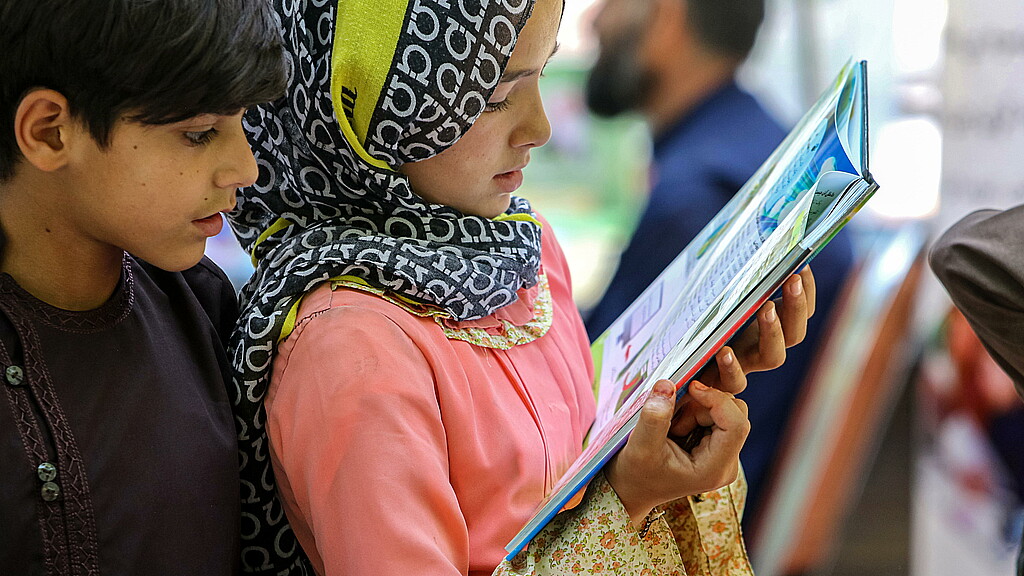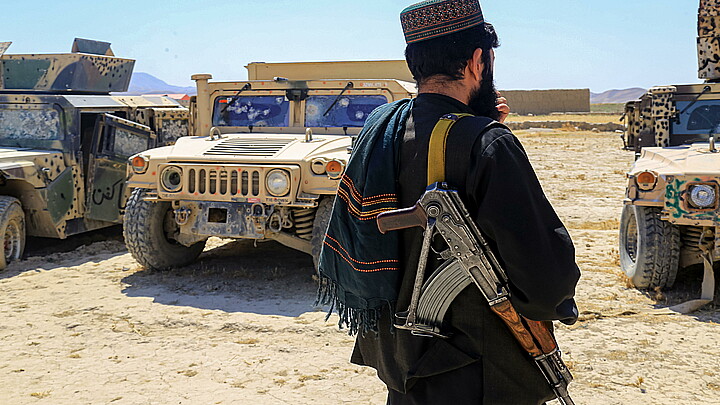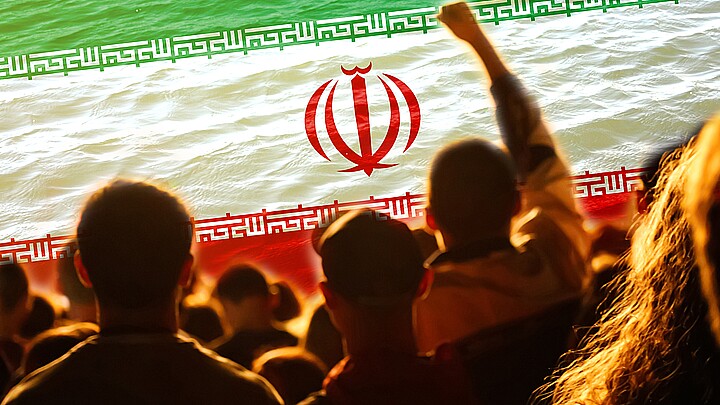Human Rights
U.S. lawmakers push bill to reimburse American vets supporting abandoned Afghan allies and their families
The vets are using their own money out of a sense of compassion and moral duty to help the Afghans who once helped them—and are struggling financially as a result

August 30, 2024 9:11am
Updated: August 30, 2024 9:16am
Three years after the U.S. forces were ordered to leave Afghanistan, some American veterans are still working hard to help their former friends, allies and comrades who were left behind under the iron grip of Taliban rule.
The vets, who are using their own money out of a sense of compassion and moral duty to help the Afghans who once helped them, are struggling financially, and some members of Congress are now pushing for legislation that would reimburse them from federal funds.
Several volunteer organizations with names like Heart of an Ace and Badger 6 have surfaced to to help those who helped U.S. forces. Other veterans are working with Afghans who were not promised an SIV (Special Immigrant Visa) a category created for civilians who assisted the U.S. but remain in danger.
One of the vets working on such efforts is Rep. Michael Waltz, a retired Green Beret who and decorated combat veteran who served in the earlier part of U.S. operations in Afghanistan. Waltz, who succeeded Florida Gov. Ron DeSantis after he vacated his congressional seat to run for governor was elected in 2018 and is a graduate from the Virginia Military Institute.
For almost 20 years, Waltz has used his own income to help support the family an interpreter who literally died in his arms while he was serving in Afghanistan. Waltz said in January that he is frustrated and heartbroken but moved over the generosity and compassion some U.S. military vets have shown in using their own money to help support Afghans who once helped them.
“I talked to a gentleman who exhausted both of his children’s 529 [education savings] plans and his entire savings and is now in divorce because of it,” Waltz said at a roundtable discussion held before the House Foreign Relations Committee. “But he can’t not answer the phone.”
In a recent interview with The Washington Post, Waltz said he understood the sense of duty and honor that kept veterans sending financial assistance to support their Afghan friends after the U.S. government and donor organizations stopped doing so.
Some U.S. officials, he said, still don’t understand “the moral injury” suffered by the veterans after the U.S. was ordered to withdraw, explaining how it created a sense of abandonment in a military culture that is taught to never leave a fallen comrade behind.
According to the U.S. State Department, more than 120,000 Afghans are applying for visas which on average take 18 months to be reviewed and approved.
To help expedite their departure from the Taliban ruled country, the United States announced an agreement with the Philippines to temporarily relocate some of the Afghanis who assisted the U.S. to the Southeastern Asian country.
So far only about 300 people of the 120,000 have been relocated, however.
That is one of the reasons that Waltz and other congressional members are pushing for passage of The Ensuring Voluntary Actions are Compensated (EVAC) Act, legislation introduced last summer by Rep. Warren Davidson (R-Ohio), which would allow any American “who expended personal funds to evacuate American citizens, lawful permanent residents of the United States, or Afghan allies from Afghanistan” to apply to the U.S. government for reimbursements.
The bill, which has already passed in the House Foreign Affairs Committee has not been brought to the House floor.
If passed, it would help reimburse those who financially support the escape of Afghanis who tried to flee between America’s chaotic withdrawal between August and November 2021.
It would also require the Secretary of State to submit their reimbursement plan to Congress after consulting with “nongovernmental organizations and veterans service organizations with expertise in supporting the evacuation of American citizens and Afghan allies from Afghanistan.”
The plan, according to the text of the proposed legislation, would require eight elements, including (1) eligibility requirements for covered United States persons to file a reimbursement claim under the plan, (2) the criteria for reimbursement, including the types of reimbursable claims and maximum reimbursement limit, (3) the process for filing a reimbursement claim, (4) an estimate of the time that would be associated with processing a reimbursement claim, (5) the supporting documentation required to file a reimbursement claim, (6) the process for disbursing funds to United States persons once a reimbursement claim is verified and approved, (7) an estimate of the costs that would be associated with implementing the plan, and (8) a list of each nongovernmental organization and each veteran service organization consulted in accordance with subsection (b)(2) during the development of the plan.”
Some of the vets who spoke to The Washington Post, chronicled their experiences and expenses as well as the stories of others.
Sean Halpin, who worked as a linguist in for Army intelligence in Afghanistan works from his Midlothian, Virginia home every morning to check in with 176 Afghan linguists and their families whom he has monitored for three years.
His goal is to ensure that the ones still seeking an exit from Afghanistan are safe. He sends continuous messages to remind them they are not forgotten and inspirational music such as the theme song from “Rocky.”
Halpin, who has covered some of their living expenses has helped pay for food and even a surgery. He has spent more than $400,000 so far, even selling a house he owned in Texas which was an investment for his family. He moved his family into an apartment instead and said the decision nearly resulted in a divorce.
He says what the U.S. did by abandoning their Afghan allies felt like “a soul-crushing betrayal.”
During Halpin’s last Afghanistan deployment in 2019, he oversaw about 200 Afghans as a linguist coordinator. Since linguistics was about building friendships with the Afghanis, he feels particularly obligated to them because he feels his particular service was emblematic of America’s commitment to protect her allies.
He said when the sudden calls to evacuate came in 2021, he had a difficult time keeping up with the messages coming in from his fellow Afghanis who were terrified about being abandoned in a country being overrun by their Taliban enemies.
“I felt betrayed,” Halpin told the Post. “The thing that resonated with me was, honor the promise, because there was a promise that was made.”
To date, Halpin has helped 28 Afghan families come to the United States, and he’s personally met with them to help them in their new journey as Americans.
In April 2023, one of his contacts, former special forces commander Akmal Amir was killed along with several other opposition members by the Taliban, forcing him to accept that his former friends and allies were going to remain in perpetual danger.
Dave Hicks, a retired one-star Air Force general founded a group that helps train and resettle Afghan pilots after they arrive in America. He said the abandonment of Afghan allies left a lot of scars for U.S. vets whose training taught them to care about human rights.
“It pulled a lot of those scabs off and reopened wounds,” Hicks said of the war’s aftermath.
Some vets are most concerned about the danger created the U.S. created for Afghans left behind. Retired Army helicopter pilot Jim Papp has been trying to help 18 Afghan pilots who he trained in Abu Dhabi as a U.S. government contractor.
He says those pilots are in particular danger because they now all have special foreign stamps in their passports, proving they assisted the U.S. in flight training—a potential death warrant if found by the Taliban.
So far, 14 of them have made it to the United States by obtaining refugee visas, and Papp has spent $50,000 of his retirement pay on helping some of them with visa fees and living expenses.
He even helped fund a safe house in Islamabad, Pakistan for some of them.
“I know these guys personally. They’re good people,” Papp told the Post. “They represent the best that Afghanistan had to offer, educated progressives. When you work with them 18 months, and you know these guys, you’re just trying to make a difference, trying to save some lives.”
Elizabeth Lynn, an Air Force and Navy veteran directs government relations for a nonprofit called “Operation Recovery,” which recently launched a website called Impacts of War.
The website is a project inviting vets to publicly document and itemize their contributions of time and money to the Afghan rescue effort.
She said the aim of the website is to remind U.S. officials of what the withdrawal from Afghanistan has cost people. She has personally, repeatedly wired money to an interpreter she personally worked with in Afghanistan.
“I don’t think that they saw what the impact of the withdrawal was,” Lynn told the Post. “We need to hand it to them in black and white and say: ‘This is what the effect of the withdrawal had on our veterans and our civilians alike that worked there for years. This is the financial toll, in addition to the mental toll, the moral injury.’ That’s not free, because that comes at a cost, and the veterans felt obligated to pay, where the government didn’t.”
One Marine Corps veteran, Peter Lucier, said it isn’t the nature of a soldier to walk away from those in need—especially their comrades who helped them.
“Is there a graceful exit?” he asked. “How does this stop being a part of your life, because it can be so consuming? Or how do you find the balance with it?”
According to Amnesty International, the U.N. Assistance Mission in Afghanistan has documented at least 3,774 casualties from August 2021 through May 2023 since the U.S. began its withdrawal efforts. Of those 3,774, 1,095 people were killed and 2,679 were wounded.
“A pattern of mass extrajudicial executions of people associated with the former government and members of armed groups resisting the Taliban continued with impunity and constituted war crimes. UNAMA recorded at least 218 extrajudicial killings of members of the former government and security personnel between August 2021 and June 2023,” the human rights organization reported.









